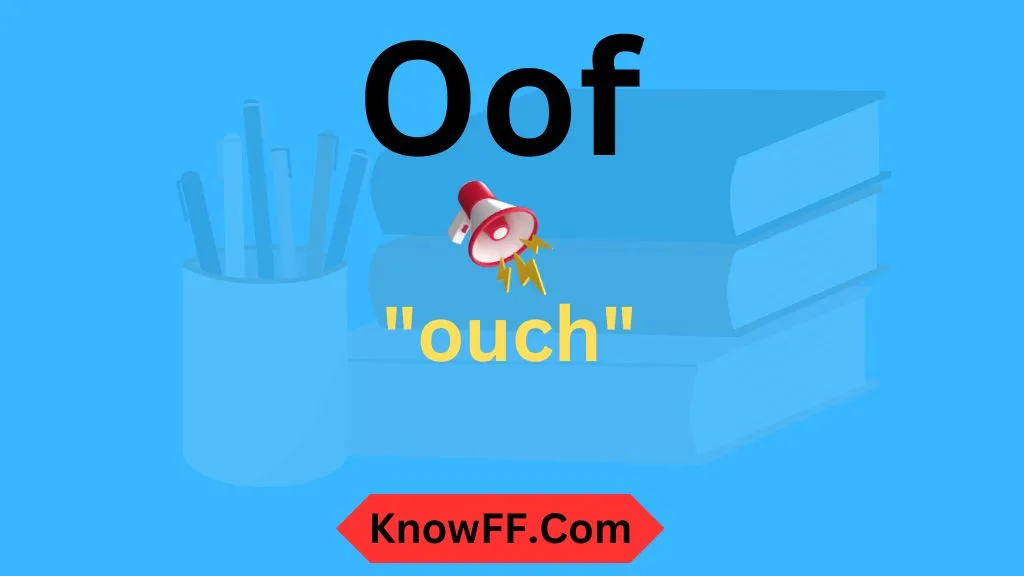If you’ve ever been scrolling through social media or chatting with friends online, you’ve likely come across the term “oof.” But what does it actually mean?
Many people search for its meaning to understand its context in digital conversations. “Oof” is a widely used slang term that expresses emotions like disappointment, sympathy, surprise, or exhaustion.
It’s commonly used in messaging apps like WhatsApp, Instagram, TikTok, and Twitter, making it a key part of digital communication.
While it originated in gaming culture, its meaning has evolved over time. This article will provide a detailed explanation of “oof,” its background, different usages, misconceptions, and more, helping you use it appropriately in conversations.
Meaning & Definition
“Oof” is an exclamation used to express various emotions, including pain, disappointment, relief, or surprise. It’s similar to phrases like “ouch” or “wow” and is often used when reacting to something unfortunate or unexpected.
Key Definitions:
- Casual Meaning: A reaction to something unpleasant, surprising, or awkward.
- Gaming Slang: Initially popularized by Roblox, where “oof” is a sound effect when a character dies.
- Conversational Usage: A filler word to express emotion in chats and social media.
The flexibility of “oof” makes it popular across various platforms, adapting to different tones and situations.
Background
The word “oof” has a long history before becoming an internet sensation. It has been used in English since the early 20th century as an onomatopoeic expression for something unpleasant or surprising.
How It Became Popular:
- Gaming Influence: “Oof” became widely recognized due to Roblox, a popular online game where characters make an “oof” sound upon death.
- Memes & Social Media: Memes featuring “oof” started circulating, reinforcing its presence in pop culture.
- Evolution in Slang: Over time, “oof” transitioned from gaming to a general conversational expression.
Its simplicity and versatility contributed to its widespread adoption, making it a staple in digital communication.
Usage in Different Contexts
“Oof” can be used in various ways, depending on the context. Whether in casual conversations, social media interactions, or even professional discussions, the meaning shifts slightly.
Common Contexts:
- Casual Chats: Used to react to unfortunate news or situations.
- Social Media: Often appears in comments or memes.
- Gaming: A humorous expression of loss or failure.
- Professional Settings: Occasionally used in informal workplace chats to acknowledge difficulties.
Since it’s an informal slang term, it’s best suited for casual conversations rather than formal discussions.
Meaning in Chat, WhatsApp, Instagram, TikTok
Each platform has its own unique way of using “oof.”
1. WhatsApp & Text Messages
- Expresses sympathy: “Oof, that sounds rough.”
- Reacts to bad news: “Oof, I forgot my assignment deadline!”
2. Instagram & TikTok
- Used in captions or comments when reacting to content.
- Example: Someone posts a meme about a failed exam, and someone comments, “Oof, relatable.”
3. Twitter & Reddit
- Used in discussions, especially when talking about awkward or painful situations.
- Example: “Oof, that take did not age well.”
Meaning in Physics, Medical, and Aircraft Terminology
Interestingly, “oof” does not have significant meanings in technical fields like physics, medicine, or aviation. However, some niche uses exist:
- Physics: Sometimes used humorously to describe force impacts.
- Medical: Informally used among medical students or professionals to react to tough situations.
- Aircraft: Occasionally seen in pilot forums as an informal way to describe a rough landing.
Despite these niche applications, “oof” remains primarily a slang term rather than a technical one.
Common Misconceptions
Some people misunderstand or misuse “oof.” Here are some common misconceptions:
- “Oof” is only for gaming – While it gained popularity in gaming, it is now widely used in daily conversations.
- It always means something bad – Not necessarily; it can also be used humorously or playfully.
- It is an outdated term – “Oof” is still relevant, especially on social media.
Similar Terms & Alternatives
If you want to use alternatives to “oof,” here are some similar expressions:
- Ouch – Expresses physical or emotional pain.
- Yikes – Used for awkward or unfortunate situations.
- Bruh – Reacts to something absurd or frustrating.
- Rip – Short for “rest in peace,” used humorously for small failures.
These words have similar connotations but can be used in slightly different ways.
How to Respond to “Oof”
When someone says “oof” in a conversation, how should you respond?
- If it’s sympathy-related: “Yeah, that sucks.”
- If it’s a joke: “Haha, yeah, that was an oof moment!”
- If unsure: A simple “Yeah… oof” works fine.
Differences from Similar Words
| Term | Meaning |
| Oof | General reaction to something bad, surprising, or awkward. |
| Ouch | Usually refers to physical pain. |
| Yikes | Used for shock or cringeworthy moments. |
| Rip | More associated with loss or failure. |
While they all express reactions, “oof” is more versatile in its usage.
Relevance in Online Conversations & Dating Apps
“Oof” is commonly seen in online chats, dating apps, and social interactions.
- Online Chats: Used to react to messages without deep conversation.
- Dating Apps: Sometimes used to acknowledge something awkward or funny.
- Memes & Trends: It remains a favorite slang term in meme culture.
Frequently Asked Questions
1. What does “oof” mean in text messages?
“Oof” expresses sympathy, surprise, or mild disappointment in a conversation.
2. Is “oof” a real word?
Yes, it is an onomatopoeic slang term but is not considered formal English.
3. Why is “oof” popular in gaming?
It became famous due to Roblox, where a character makes an “oof” sound when dying.
4. Can “oof” be used positively?
Rarely, but in some cases, it can acknowledge an impressive or unexpected event.
5. Is “oof” outdated slang?
No, it is still widely used, especially in memes and digital conversations.
6. How do you pronounce “oof”?
It is pronounced as “oof” (rhymes with “roof”).
7. Can “oof” be used in professional settings?
It’s best suited for informal or casual workplace chats rather than formal conversations.
Conclusion
The term “oof” has evolved from gaming slang to a widely used expression in digital conversations. Its versatility allows it to fit various contexts, from expressing sympathy to reacting humorously.
Whether in text messages, social media, or online forums, “oof” remains a key part of internet culture.











